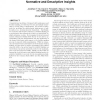Free Online Productivity Tools
i2Speak
i2Symbol
i2OCR
iTex2Img
iWeb2Print
iWeb2Shot
i2Type
iPdf2Split
iPdf2Merge
i2Bopomofo
i2Arabic
i2Style
i2Image
i2PDF
iLatex2Rtf
Sci2ools
103
click to vote
ATAL
2009
Springer
2009
Springer
Self-deceptive decision making: normative and descriptive insights
Computational modeling of human belief maintenance and decision-making processes has become increasingly important for a wide range of applications. We present a framework for modeling the psychological phenomenon of selfdeception in a decision-theoretic framework. Specifically, we model the self-deceptive behavior of wishful thinking as a psychological bias towards the belief in a particularly desirable situation or state. By leveraging the structures and axioms of Expected Utility (EU) Theory we are able to operationalize both the determination and the application of the desired belief state with respect to the decision-making process of expected utility maximization. While we categorize our framework as a descriptive model of human decision making, we show that in certain circumstances the realized expected utility of an action biased by wishful thinking can exceed that of an action motivated purely by the maximization of perceived expected utility. Finally, we show that our frame...
Artificial Intelligence | Artificial Intelligence | ATAL 2009 | Expected Utility | Wishful Thinking |
Related Content
| Added | 26 May 2010 |
| Updated | 26 May 2010 |
| Type | Conference |
| Year | 2009 |
| Where | ATAL |
| Authors | Jonathan Y. Ito, David V. Pynadath, Stacy C. Marsella |
Comments (0)

